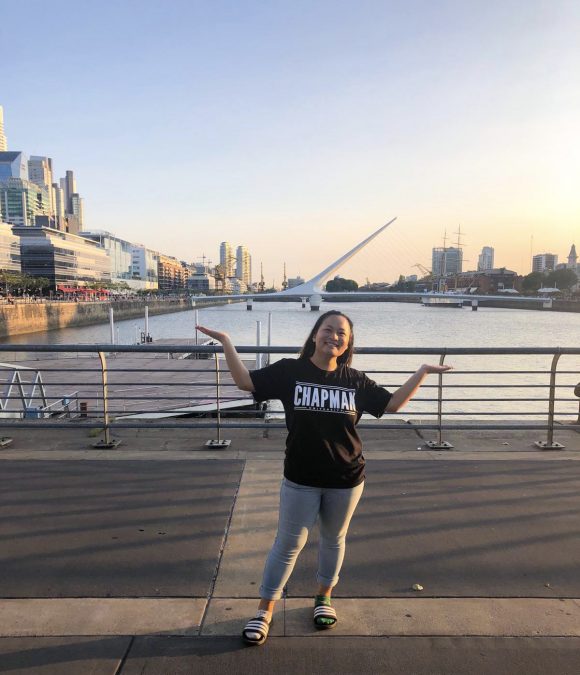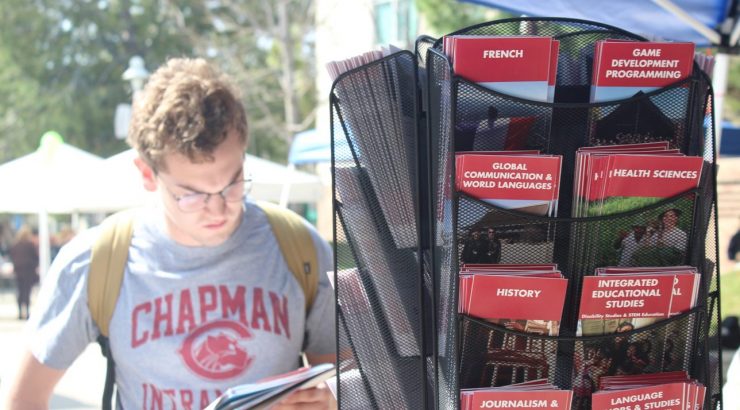Creative Ways of Fundraising to Study Abroad 13 Unique Ways to Raise Money
June 25, 2020
Finances are often one of the biggest obstacles students face to study abroad, so we have compiled a list of ways Chapman students have fundraised and saved money for their global education experiences. With the money you fundraise, you could afford to participate and indulge in various opportunities abroad, such as taking a local cooking class, attending a football (soccer) match, buying fruit from a community farmer’s market, or going backpacking after your program. What will you do with the funds you raise?
1. Create & sell (i.e. paint Hydro Flasks)
Nicole Williams ‘20 utilized her artistic talent to paint people’s Hydroflasks and raised money for her semester abroad in Spain in spring ‘18 (Spanish Studies Abroad – Spanish Studies Program) and a Travel Course to Argentina during Interterm ‘20 (Spanish Language and Culture, Argentina).
“Prior to studying abroad, I was interested in finding a way to earn money to help offset the cost of my plane tickets. After watching a video of someone who had the genius idea of painting their Hydro Flask, I went to Michael’s, bought paintbrushes and a 36-pack of paint, and decided to see if I was any good at painting my own Hydro Flask. I ended up showing some friends and telling family, and I actually gained a lot of support and interest in custom paintings. This opened my eyes to the fact that, while some people choose to utilize traditional fundraising methods, there are also other ways to creatively reimagine talents you already possess. I’m grateful to have been able to do something that I enjoy – create art – while at the same time earn money so that I could afford to study abroad and experience life in another country.”
– Nicole Williams ‘20

How can you use your talents to create and sell?
2. Sell old belongings

Ryan Ireland ’20 went on two summer Travel Courses in ’17 and ’19 to Taiwan and participated in a semester abroad in London, England (Arcadia University – City, University of London) in fall ’17. He had friends who held a garage sale to raise money.
“While I regret not personally doing this, I have met different people who had garage sales in order to raise money for Travel Courses. So many people have old junk laying around at home that they want to get rid of, but do not know what to do with it. A garage sale is a quick way to not only get rid of stuff you no longer need, while also raising a decent amount of money to use while abroad.”
– Ryan Ireland ’20
If you want to be able to do more things abroad, try selling old things that you don’t use any more. If you don’t have enough to host your own garage sale, you can host a joint sale with other students planning to go abroad, or use an online seller. Nowadays, you can sell via Facebook marketplace, eBay, craigslist, letitgo, or other convenient online mediums.
3. Live cheap in country
Aside from fundraising, Caroline Destefano ‘19 found ways to save in-country which enabled her to maximize her time abroad. Caroline attended Semester at Sea (SAS) in spring ‘18 through which she visited eleven countries including Japan, India, South Africa, Morocco, and Portugal.
“I mostly relied on cheap options when in-country (airbnbs, hostels, etc.). Also, for SAS, an easy way to save is by eating or sleeping on the ship in port… the ship food is typically better while in-country.”
– Caroline Destefano ‘19

Regardless of where you study abroad, there are bound to be cheap in-country dining options. Dining at family-owned or local restaurants can be a great way to save money while investing in the local economy and experience regional cuisines. Furthermore, cooking for yourself can save you money while immersing yourself in the local cuisine. Try to find a local farmer’s market for inexpensive, local produce!
You can also try the following fundraising techniques:
4. $5 postcards
Offer to send a handwritten postcard from your destination abroad to your family and friends if they donate $5-$10 to support you. Additionally, once abroad, you can send postcards to family and friends wishing them well and include a link to donate to you. Try including your Venmo or a link to a crowd-source fund (i.e. GoFundMe).
5. Keep an online blog
Create an online blog and share it with your family or mentors and ask them for a monthly donation to sustain the blog. You can promise to post 1-2x per week. It’s a great way for you to set up a communication plan with them, and for them to keep up with your activities and support you.
6. Trade birthday and holiday gifts
Notify your gift-givers that you will trade your upcoming birthday and/or holiday gift for a donation to your experience abroad. Rather than material gifts, you could get a trip to a surrounding country. With several possible gift-giving holidays throughout the year, think about the opportunities to share your upcoming global experience with friends and family and receive their support for your study abroad.
7. Cut current expenses
Think about the last time you bought something on Amazon. Was it essential to your life? People often buy impulsively and out of convenience, especially at Starbucks. We recommend deleting the Amazon app, making your own coffee, and reading your bank statement to see where you can cut down. Nowadays, there are apps to help with budgeting and cutting down. Mint is great for in-depth budgeters and allows you to sync your bank accounts. PocketGuard is best for simple budgeters. Both are free to use.
8. Buy, refurbish, & resell
Many donate to thrift stores without verifying how much their items are worth. You may be able to find a valuable item, refurbish it (if necessary), and resell it through Facebook marketplace, eBay, craigslist, letitgo, or other convenient online mediums.
9. Do chores for neighbors
When back home or if you have residential neighbors where you live near campus, offering your services for household chores can earn you some additional funds. Your neighbors may appreciate you mowing their lawn or taking out their trash weekly. Doing it for them for a modest price will make their lives easier and increase your financial resources.
10. Recycle
Think about all the bottles, cans, and cartons that your house accumulates throughout a semester. Rather than throwing them in the recycling bin, you can store them and take them into a recycling center for a quick sum of money. There are several recycling centers throughout the city of Orange, and even a few within two miles of campus. Saving all your recyclable materials could earn you some additional funds at the end of the semester.
11. Add advertisements to social media
If you host any social media accounts that allow for advertising, you can consider allowing third parties to market on your account. As examples, this can be in the form of intermittent ads on a Youtube video or a link to a product on your homepage. When deciding to allow for advertising, consider how this can affect your page’s reputation and how you will inform your followers.
12. Crowdfunding and post on social media
Creating GoFundMe pages or other crowd funding sites can be intimidating. For example, you may worry that you will not garner enough support to meet your goal. Nevertheless, assessing risk and confronting what may intimidate you are pivotal steps towards personal development abroad. Furthermore, crowdsourcing is a great way to get the word out and garner as much support as possible. Consider adding your funding page to your social media accounts and posting about them. The more people who know about your upcoming experience, the more opportunities you have for donations.
13. Scholarships
You cannot win a scholarship unless you apply for it. There are many study abroad scholarships available for students. Although scholarships are not necessarily unique or creative ways of fundraising, they are essential to financial aid. You can start your scholarship search with the CGE’s Global Education Scholarships and Funding page. You can also search online for additional study abroad scholarships. In fall 2020, the CGE will host a workshop about applying to scholarships. Subscribe to our newsletter so you don’t miss it!
Lastly, we recommend identifying goals for specific expenses as opposed to the entire cost of your program. An unrealistically high goal can discourage donors who are more likely to provide you funding for something they can acknowledge helping you out with, such as airfare, housing, meals, textbooks, local transportation, or a particular excursion. If you set those goals individually and reach them one by one, then you could raise enough money for all of them.
What will you do to fundraise for your global education experience? You can utilize one of our suggested methods or find a different method that works best for you. If you have another method in mind, comment below to share your idea and help future students raise money for their experiences.
Want to discuss fundraising, scholarships, and budgeting abroad in more detail? Make an appointment with your global education advisor. See the CGE Meet the Team page to identify your advisor and click on “Schedule an appointment with me.” We look forward to meeting you!


